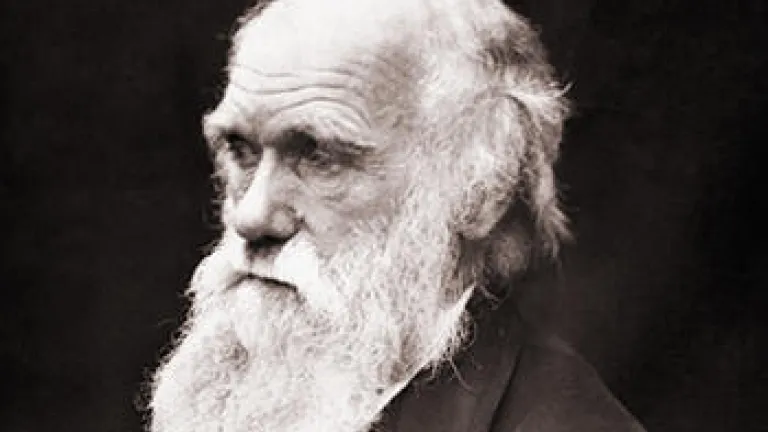Charles Darwin's Deadly Secret

Especially in the Western world, most people simply accept the theory of Darwinian evolution as a fact. What many don't know is that this theory is partially responsible for many of the most tragic historical events of the 20th century.
Though the theory of evolution has widespread acceptance, its origins are more sinister than most people have been led to believe. Charles Darwin launched evolution into the public eye with his works on the subject, but the idea didn't originate with him. The germs of it were ancient! The Greek philosopher Epicurus (341-270 B.C.) "saw the world and all life as part of a self-creating cosmos, with life just happening" (Marvin Olasky, "Staring at Death," World, July 13, 2013).
Epicureanism existed for several centuries after the death of Epicurus. At its core this philosophy emphasized physical pleasure as the primary goal in living. It denied any spiritual component to life.
The Roman poet and philosopher Lucretius (99-55 B.C.) was an Epicurean and so believed pleasure was the ultimate good. He described the ideal life this way: "Men can lie on soft turf side by side under a tall tree's branches near a stream, and easily, pleasantly, care for creature needs" (On the Nature of Things, translated by Frank Copley, 1977, p. 29).
Lucretius also believed that man had no chance for immortality. He wrote, "'Asleep in death'; so shall you be for all that's left of time" (p. 77). He believed there is no such thing as divine intervention, miracles or eternal life.
Lucretius had a view of the beginning of life that sounds amazingly like spontaneous generation: "Rightly the earth is left then with the name of mother, since of the earth all things are born. And even now from earth rise many creatures molded by rain and by the sun's hot breath" (p. 131).
Darwin popularized old ideas
Charles Darwin was not the first evolutionist, even in modern times. In fact, his grandfather, Erasmus Darwin, was also an evolutionist (Paul Johnson, Darwin: Portrait of a Genius, 2012, p. 41).
Charles Darwin just popularized the idea of evolution with the publication of his book On the Origin of Species. Eventually the concept of evolution would sweep the world. And this was not a "harmless" idea. It would be destined to give root to much evil—including the deaths of millions of innocent people, as we'll see shortly. Evolutionary theory is the enemy of civil life, love, religion and God.
Many scientists and professors are converts to what amounts to the religion of evolution. Here is what one evolutionary biologist wrote: "Evolution is the most important concept in biology. There is not a single Why? question in biology that can be answered adequately without a consideration of evolution. But the importance of this concept goes far beyond biology. The thinking of modern humans, whether we realize it or not, is profoundly affected—one is almost tempted say determined—by evolutionary thinking" (Ernst Mayr, What Evolution Is, 2001, p. xiii, emphasis added throughout).
Professor Mayr is correct in saying that the thinking of "modern humans" is profoundly affected. It has deceived millions of people into thinking that life has no transcendent purpose. Famed evolutionist and atheistic activist Richard Dawkins said that there is "no design, no purpose" in our existence. His conclusion is that human beings blindly "dance" to the music of our own DNA (River Out of Eden, 1995, p. 133).
Well, countless human beings have danced many insane "jigs"! Their "spiritual insanity" ranges from unbiblical discrimination to evil eugenics to cold-blooded murder. One of Darwin's own teachers, Adam Sedgwick, warned that humanity under the influence of evolutionary thought "would abandon all the moral codes that allowed civilization to survive" (Carl Zimmer, commentary within Charles Darwin, The Descent of Man, and Selection in Relation to Sex, 2007, p. 151).
Moral codes that govern society have often been compromised. Often the failure of morality can be directly traceable to evolution and disbelief in God. Examples range from simple discrimination to outright brutality.
From Darwin to Hitler
Here is what Viktor Frankl, a Holocaust survivor, had to say about the influence of evolutionary thought in the development of the holocaust:
"The gas chambers of Auschwitz were the ultimate consequence of the theory that man is nothing but the product of heredity and environment—or, as the Nazi liked to say, of 'Blood and Soil.' I am absolutely convinced that the gas chambers of Auschwitz, Treblinka, and Maidanek were ultimately prepared not in some Ministry or other in Berlin, but rather at the desks and in the lecture halls of nihilistic scientists and philosophers" (The Doctor and the Soul: From Psychotherapy to Logotherapy, 1986, p. xxvii).
Hitler claimed to be a promoter of Christianity. Observe what he once said to a group of pastors: "Reverend sirs . . . I have gladly accepted your invitation in order to make known to you my program for the churches. I would like to convince you that I am working for the moral recovery of our nation just as you are.
"Since her defeat, Germany needs Christianity more than ever. She needs the churches. We must halt the movement of the godless. We need your support. We need the support of all who have the interests of the Fatherland at heart" (Leo Stein, Hitler Came for Niemoeller: The Nazi War Against Religion, 2003, p. 78).
In retrospect it's clear that Hitler's appeal was simply dishonest doublespeak. Author William Shirer noted that, far from restoring a Christian morality to the country, "the Nazi regime intended eventually to destroy Christianity in Germany, if it could, and substitute the old paganism of the early tribal Germanic gods and the new paganism of the Nazi extremists" (The Rise and Fall of the Third Reich, 2011, p. 240).
Christianity, with its focus on helping others, was looked on as weak contrasted with the "might makes right" philosophy born in part out of Darwinian "survival of the fittest" and violence in the evolution of species.
The concept of evolution was also highly influential in the development of eugenics. Hitler believed in the superiority of the German people and that they had a right to improve the human race by eliminating "lesser" groups of people (Richard Weikart, From Darwin to Hitler, 2004, p. 212).
The Nazis were determined to make sure that the Jews didn't survive and "evolve any further." So senior officials of the Nazi regime held a conference in 1942 at Wannsee, Germany, a suburb of Berlin, to lay out "the final solution" and inform administrative leaders of departments responsible for various policies relating to Jews.
One of the most significant statements of their official policy was as follows: "In the course of the final solution and under appropriate leadership, the Jews should be put to work in the East. In large, single-sex labor columns, Jews fit to work will work their way eastward constructing roads. Doubtless the large majority will be eliminated by natural causes.
"Any final remnant that survives will doubtless consist of the most resistant elements. They will have to be dealt with appropriately, because otherwise, by natural selection, they would form the germ cell of a new Jewish revival" (Mark Roseman, The Wannsee Conference and the Final Solution, 2002, p. 101).
The death toll from godless states
The statement from the Wannsee Conference uses several phrases showing that the survival-of-the-fittest doctrine from the theory of evolution was used to attempt to exterminate ethnic groups of people. Yet this was not the only mass-extermination "experiment" in the 20th century by totalitarian regimes.
"If you were just to examine the big three atheistic regimes of the twentieth century—Mao in China, Stalin in Russia, and Hitler in Nazi Germany—then you would discover that they are responsible for more than 100 million deaths. This number does not even include death tolls from other regimes like Pol Pot's mass killings in Cambodia" (Sean McDowell and Jonathan Morrow, Is God Just a Human Invention? 2010, pp. 138-139).
Obviously the lack of faith in a just, watchful God only created more intense violence and immorality in these societies. The most vulnerable citizens were the ones to suffer because of a worldview that rejects the Creator God as the ultimate moral authority. This is the reality at the root of secular societies.
"The fool has said in his heart, 'There is no God.' They are corrupt, they have done abominable works, there is none who does good" (Psalm 14:1).
Such a person either truly believes there is no God or he or she doesn't care. "God is not important in his life," one commentary on this scripture notes. "He shuts off the affairs of this world from divine intervention and denies any personal accountability to God for his actions" (Expositor's Bible Commentary, Vol. 5, p. 143). And the problem is widespread: "As God observes mankind, he is overwhelmed by the evil he sees. It seems as if 'all have turned aside,' have 'become corrupt,' and no one 'does good'" (ibid., p. 145).
That is the way it was in the days of Noah (see Genesis 6:5), and Jesus said things would be this way again at the end of this age (Matthew 24:37). Sadly, humanity will continue down this path of degradation as we reject God.
Social Darwinism and its effects
Darwinian evolutionists believe that life evolved. Social Darwinism is the idea that ruthless, atheistic egotism is the most successful policy. In other words, each individual's best course of action is to take care of oneself, regardless of the consequences for others.
It also posits that life evolves not only biologically, but also intellectually and culturally. And those people deemed superior to others in these various ways are reckoned as having more of a right to life.
If law, government and religion evolved, that means there are no absolutes. This makes for an "anything goes" society. You can do whatever you want. Superiors can kill inferiors in innocence, as the thinking goes—and as has been the practice of a number of genocidal governments.
Why Jesus Christ must return
When Jesus Christ gathered with His disciples a short time before His death, they asked Him what signs would precede His return to earth.
Jesus answered with a list of conditions and events, starting with early problems extant in that day that would spike in frequency and intensity toward the end of the age: "For nation shall rise against nation, and kingdom against kingdom. And there will be famines, pestilences, and earthquakes in various places. All of these are the beginning of sorrows" (Matthew 24:7-8).
These things have been on the rise in the past century and will become increasingly worse. Astronomer and author Martin Rees commented that though natural disaster has been humanity's greatest threat throughout the ages, modern society is most challenged by warfare and genocide:
"One estimate suggests that in the two world wars and their aftermath, 187 million perished by war, massacre, persecution, or policy-induced famine. The twentieth century was perhaps the first during which more were killed by war and totalitarian regimes than by natural disasters" (Our Final Hour, 2004, pp. 25-26). In war, anything goes!
The theory of evolution and the atheism and social Darwinism it has led to are the result of a world that has turned its back on God. This is a world tumbling toward a time of great trouble as foretold by Jesus Christ.
The second seal of Revelation also prophesies a time of horrendous war: "When he opened the second seal, I heard the second living creature call out, 'Come!' And out came another horse, bright red; its rider was permitted to take peace from the earth, so that people would slaughter one another; and he was given a great sword" (Revelation 6:3-4, New Revised Standard Version).
This sobering vision depicts a bloody world brought about by mankind's rejection of God and the amoral, empty premise of Darwinian evolution.
God's message, however, is ultimately one of hope. The Bible tells us that Jesus Christ will intervene to prevent the war of wars from coming to the point of annihilating humanity: "And unless those days were shortened, no flesh would be saved [alive]" (Matthew 24:22).
Christ will return at the seventh trumpet to save mankind from this end (Revelation 11:15). Some rebels and evolutionists may curse and blaspheme God (compare Revelation 16:11). Yet if they deeply repent, they can receive salvation from the God they currently defy and despise.
In time, according to God's purpose and plan, mankind will finally learn how evil the way of warfare and the other deadly ideas that flow from Darwinian evolution truly are. Then the peace of the Kingdom of God will reign forever!






